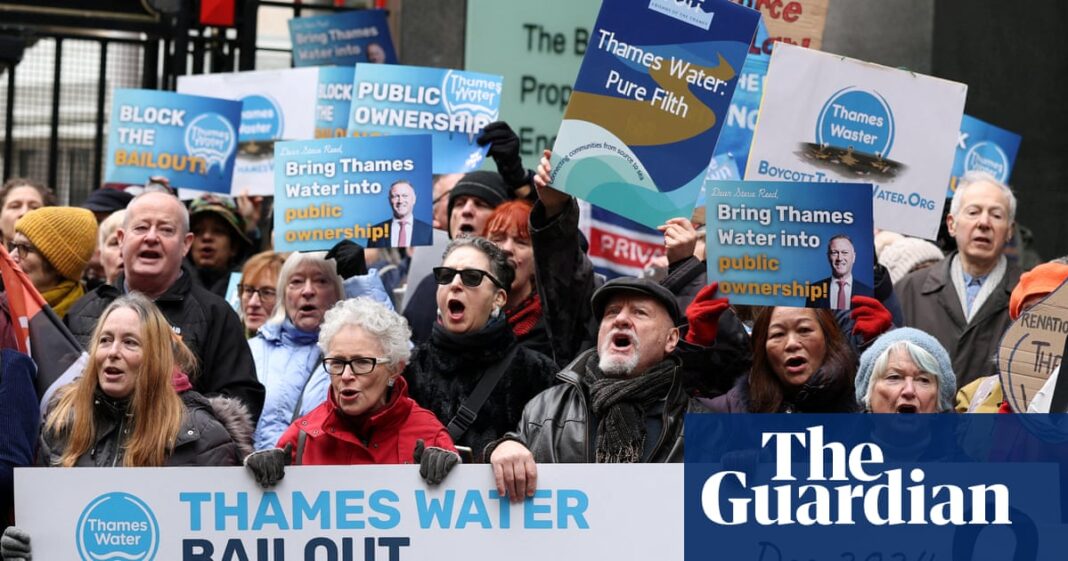Thames Water has won court approval for an emergency debt package worth up to £3bn that should stave off the collapse of Britain’s biggest water company for at least another few months.
London’s high court said on Tuesday that the deal could proceed, after hearing four days of complex arguments earlier this month over whether it should go ahead. The deal will allow the company to avoid special administration, in effect a temporary nationalisation.
Thames, which has 16 million customers and 8,000 employees, has been on the verge of collapse for months, with debts of about £19bn. The financial difficulties have contributed to underinvestment in the pipes and drains needed to prevent sewage overflows into rivers and seas.
The deal will give Thames £1.5bn in cash, released monthly, plus up to £1.5bn more to see it through an appeal to try to increase bills by more than the 35% allowed by the industry regulator for England and Wales, Ofwat.
On Friday, Thames announced the appeal, to be decided by the Competition and Markets Authority (CMA), as it awaited the court judgment.
Thames had argued in court that it would run out of money on 24 March if the emergency debt deal did not go through. It will still have to raise billions of pounds of additional equity to repair its finances over the longer term. The company last week said it was considering several bids from unnamed parties.
The judge, Mr Justice Leech, wrote that he should give the company the chance to “finish the jigsaw” and find further new investors before imposing the costs of a special administration on the government.
Adrian Montague, Thames’s chair, said: “The court’s approval of the company plan marks a significant milestone for Thames Water, enabling us to proceed with the implementation of the liquidity extension transaction.
“Its implementation is a key step in strengthening our long-term financial resilience and will allow us to continue progressing the equity raise process and a holistic recapitalisation transaction as well as complete the CMA appeal process. Critically, it enables the management team to continue progressing the turnaround.”
The company said the first £1.5bn would give it enough cash to continue operating until September, with the extra £1.5bn allowing it to continue until May 2026 if required during the CMA review.
The judge wrote that he “might have been tempted to refuse to sanction the plan” because of the “eye-watering” £800m to be spent on interest costs and advisers for the debt deal. However, he judged that Thames and its customers would not have to bear those costs, because creditors would have to accept losses.
Yet, he wrote: “Customers and residents who are struggling with their bills will be horrified at these costs and mystified how the Thames Water Group has been able to fund them or why it has agreed to do so.”
While the company had argued in favour of the deal, it faced opposition in court. The Liberal Democrat MP Charlie Maynard was allowed to intervene in the case to argue that the interests of consumers would be better served by government control.
Matthew Topham, a campaigner at the public services campaign group We Own It, said: “This crisis loan will keep Thames afloat in the short term, but their underlying business model is rotten and should be condemned.
after newsletter promotion
“This is the ‘doom loop’ of privatised water and there is only one way to break the cycle – public ownership.”
Cliff Roney, a retired former Thames Water employee and representative of the GMB union, said: “The government must urgently bring Thames Water into public ownership while protecting staff terms, conditions and pensions.”
The case had pitted two groups of existing creditors against one another as each argued that its offer was the better.
The successful group, holding almost £12bn of class A debt, included investors such as Abrdn and Insight Investment as well as hedge funds and other investors in distressed companies, such as Elliott and Silver Point. The other, smaller group, holding class B debt, included the hedge funds Polus Capital and Covalis Capital. The class B group was unsuccessful.
A spokesperson for the class A group said the judgment was “a positive step” in a process and the company’s debts would be “significantly reduced”.
Maynard and the class B group were granted permission to appeal.
A spokesperson for Ofwat said: “We continue to engage with the company on ensuring it continues to deliver for customers and as its recapitalisation process moves forwards.”


